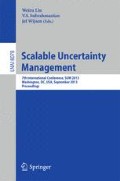Abstract
In a previous work we defined a recursive warrant semantics for Defeasible Logic Programming based on a general notion of collective conflict among arguments. The main feature of this recursive semantics is that an output of a program is a pair consisting of a set of warranted and a set of blocked formulas. A program may have multiple outputs in case of circular definitions of conflicts among arguments. In this paper we design an algorithm for computing each output and we provide an experimental evaluation of the algorithm based on two SAT encodings defined for the two main combinatorial subproblems that arise when computing warranted and blocked conclusions for each output.
Access this chapter
Tax calculation will be finalised at checkout
Purchases are for personal use only
Preview
Unable to display preview. Download preview PDF.
References
Alsinet, T., Béjar, R., Godo, L.: A characterization of collective conflict for defeasible argumentation. In: COMMA 2010, pp. 27–38 (2010)
Alsinet, T., Béjar, R., Godo, L., Guitart, F.: Maximal ideal recursive semantics for defeasible argumentation. In: Benferhat, S., Grant, J. (eds.) SUM 2011. LNCS, vol. 6929, pp. 96–109. Springer, Heidelberg (2011)
Alsinet, T., Béjar, R., Godo, L., Guitart, F.: Using answer set programming for an scalable implementation of defeasible argumentation. In: ICTAI 2012, pp. 1016–1021 (2012)
Amgoud, L.: Postulates for logic-based argumentation systems. In: ECAI 2012 Workshop WL4AI, pp. 59–67 (2012)
Cecchi, L., Fillottrani, P., Simari, G.: On the complexity of DeLP through game semantics. In: NMR 2006, pp. 386–394 (2006)
Chesñevar, C.I., Simari, G.R., Godo, L.: Computing dialectical trees efficiently in possibilistic defeasible logic programming. In: Baral, C., Greco, G., Leone, N., Terracina, G. (eds.) LPNMR 2005. LNCS (LNAI), vol. 3662, pp. 158–171. Springer, Heidelberg (2005)
Eén, N., Sörensson, N.: An extensible SAT-solver. In: Giunchiglia, E., Tacchella, A. (eds.) SAT 2003. LNCS, vol. 2919, pp. 502–518. Springer, Heidelberg (2004)
García, A., Simari, G.R.: Defeasible Logic Programming: An Argumentative Approach. Theory and Practice of Logic Programming 4(1), 95–138 (2004)
Pollock, J.L.: A recursive semantics for defeasible reasoning. In: Rahwan, Simari (eds.) Argumentation in Artificial Intelligence, pp. 173–198. Springer (2009)
Author information
Authors and Affiliations
Editor information
Editors and Affiliations
Rights and permissions
Copyright information
© 2013 Springer-Verlag Berlin Heidelberg
About this paper
Cite this paper
Alsinet, T., Béjar, R., Godo, L., Guitart, F. (2013). On the Implementation of a Multiple Output Algorithm for Defeasible Argumentation. In: Liu, W., Subrahmanian, V.S., Wijsen, J. (eds) Scalable Uncertainty Management. SUM 2013. Lecture Notes in Computer Science(), vol 8078. Springer, Berlin, Heidelberg. https://doi.org/10.1007/978-3-642-40381-1_6
Download citation
DOI: https://doi.org/10.1007/978-3-642-40381-1_6
Publisher Name: Springer, Berlin, Heidelberg
Print ISBN: 978-3-642-40380-4
Online ISBN: 978-3-642-40381-1
eBook Packages: Computer ScienceComputer Science (R0)

